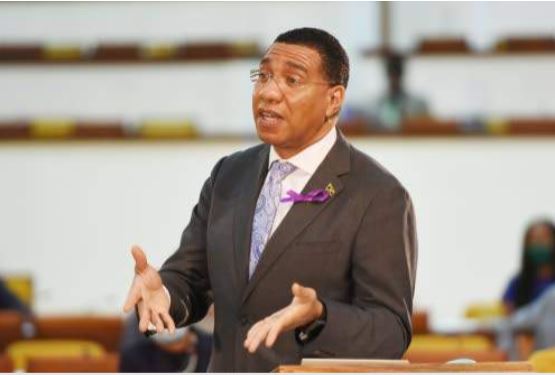KINGSTON, Jamaica— Prime Minister Andrew Holness, has affirmed Jamaica’s commitment to sustainably manage 100 per cent of the country’s national waters to aid in protecting the ocean’s resources globally.
This is in keeping with a new ocean action agenda focusing on developing a sustainable ocean economy, by effectively balancing conservation and sustainable use of the resources of the sea.
The agenda has been proposed by a High-Level Panel for a Sustainable Ocean Economy (Ocean Panel) comprising 14 world leaders, including Holness.
“I reiterate that the richness of Jamaica’s oceans must be managed sustainably to ensure that productivity and diversification is achieved for the benefit of people and communities whose livelihoods depend on it and for the benefit of a healthy planet,” the prime minister said.
He was speaking at the virtual national launch for the new global agenda yesterday.
Holness said that on December 2, Ocean Panel members collectively put forward a new ocean action agenda “to achieve 100 per cent sustainable ocean management of areas with a national jurisdiction guided by sustainable ocean plans by 2025, and to support a global target to protect 30 per cent of the ocean by 2030.”
Since December 3, Ocean Panel countries have been hosting a series of national launch events to signify and build global political will around their commitments.
Holness said that the new ocean agenda is the result of an unprecedented scientific knowledge base for action, including 20 commissioned blue papers, three special reports, and a politically endorsed document, titled, ‘Transformations for a Sustainable Economy: A Vision of Protection, Production and Prosperity’.
“The transformations document set out a headline commitment to 100 per cent sustainable ocean management in national waters and offers 74 priority actions that focus on five critical areas – ocean wealth, ocean health, ocean equity, ocean knowledge and ocean finance. Together, they point to where the world should be in the next decade when the United Nations (UN) Decade of Ocean Science for Sustainable Development and the 2030 Agenda for Sustainable Development conclude,” he noted.
The prime minister said he is pleased to bring national spotlight to this global initiative, noting that Vision 2030, Jamaica’s National Development Plan, actively advocates for the sustainable management and use of environmental resources.
“This national commitment towards achieving ocean sustainability in Jamaica was bolstered by the establishment of the multi-agency National Council on Ocean and Coastal Zone Management to formulate marine sector policies and promote public awareness of the importance of marine resources to sustainable development,” he said.
The prime minister also highlighted initiatives currently being pursued that recognise the importance of national ocean resources, including the World Bank-funded project for assessment and economic valuation of coastal protection services provided by mangroves in Jamaica, being implemented by the University of the West indies (UWI), among other partners.
“The project aims to provide an estimate of economic value of coastal protection services provided by mangrove ecosystems. Under the project, a habitat risk assessment will be carried out to evaluate the impact of human activities on mangroves and to identify potential reduction of ecosystem services involved in coastal protection,” he said.





